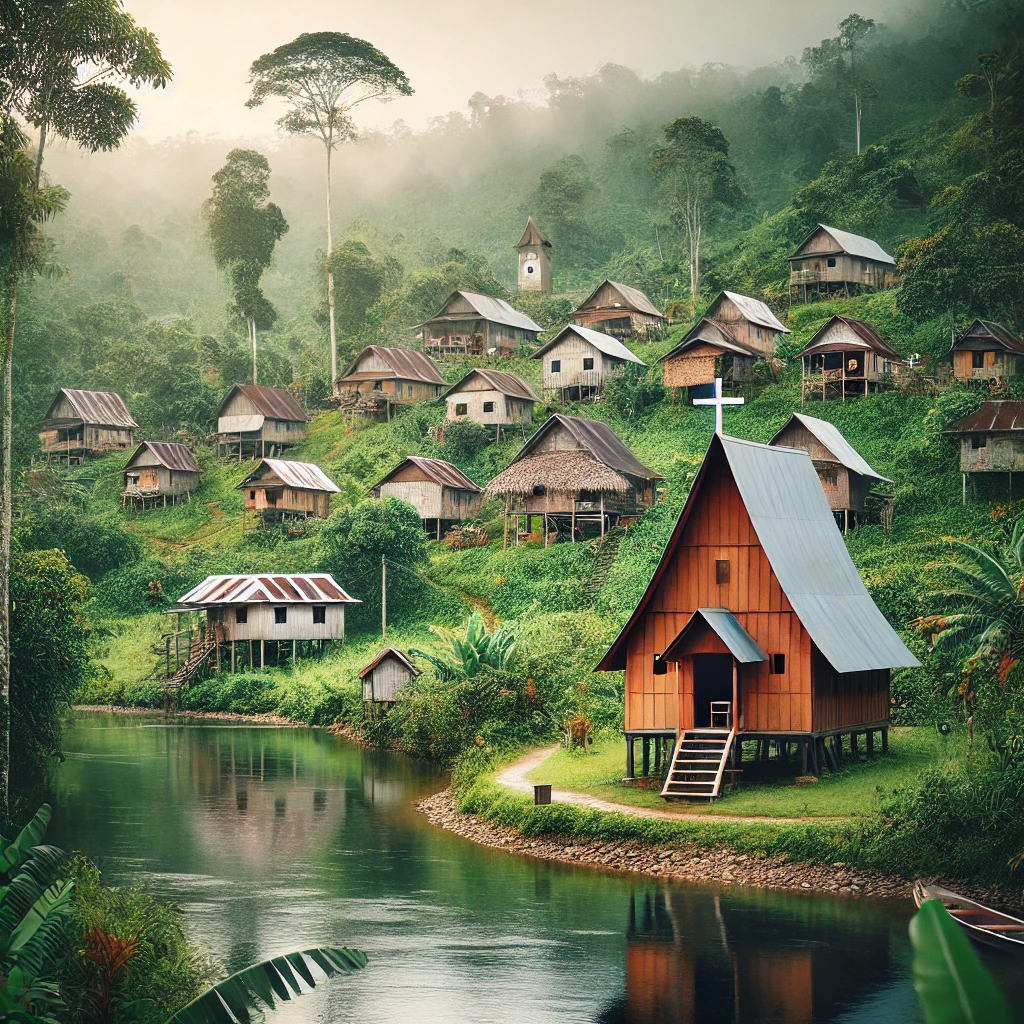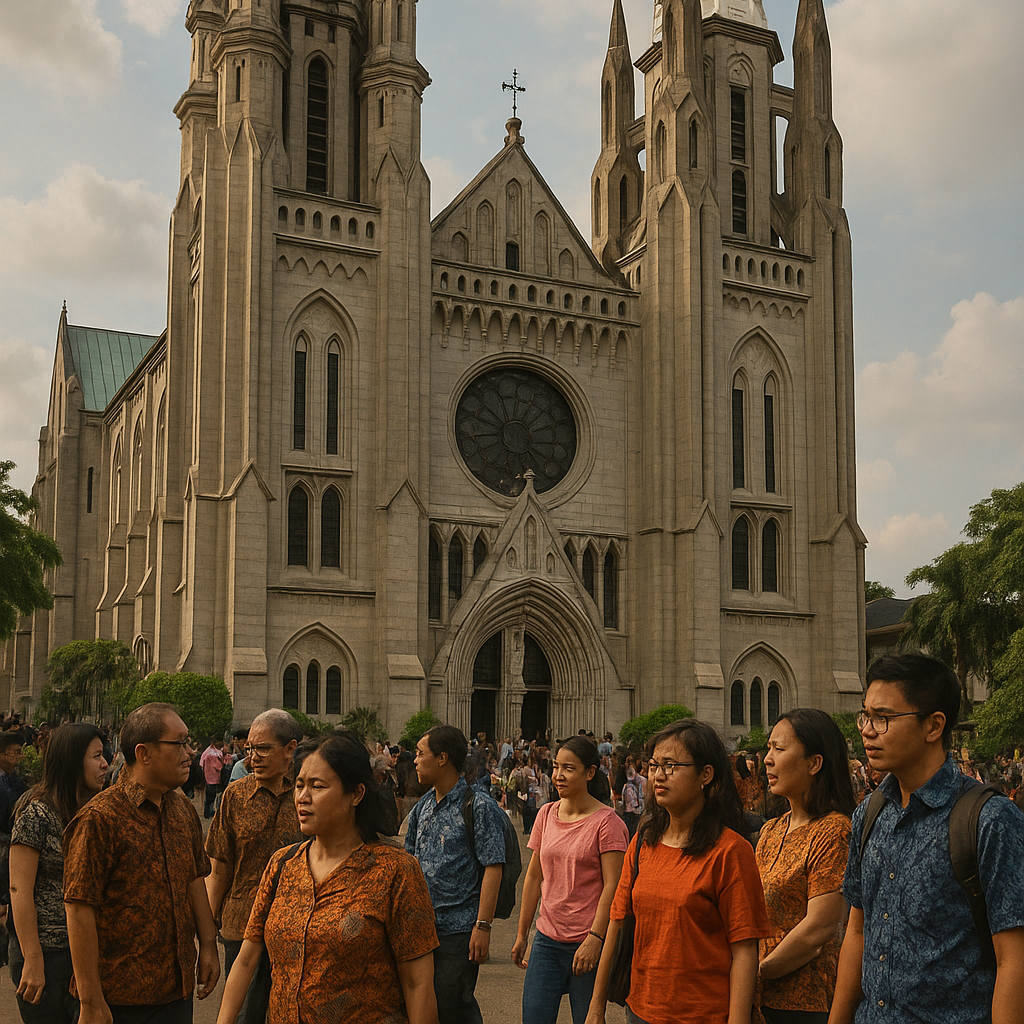The Journey of Christianity in Watubela, Maluku: History, Dynamics, and Acculturation in Society
theolingua.id – Watubela Islands, or more familiarly known as Watubela, is an area of Eastern Indonesia located in East Seram Regency, Maluku Province. The region borders Seram Island directly to the east, the Gorom Islands to the southeast, the Kei Islands to the north, and the Bomberai Peninsula to the southwest.
Watubela was once mentioned in Alfred Russel Wallace’s book The Malay Archipelago by the name of Matabello. This book by Alfred Russel Wallace is the work of eight years of his journey exploring the Indonesian archipelago. The book specifically tends to discuss the diversity of flora and fauna in the Asia-Pacific region. In addition, Alfred Russel Wallace compiled this book chronologically. So notes about the time of the incident are not a priority in his research, so we will have difficulty verifying when the incident took place.
In terms of demographics, the majority of Watubela’s population work as fishermen, farmers, and small traders. The main livelihood of the community depends on the sea, such as fishing and seaweed cultivation. In the agricultural sector, the local community earns income from rice, corn, sweet potatoes, peanuts, mung beans and soybeans, which are the main commodities. The population in the Watubela area is quite mobile, especially in terms of trade and social relations with the surrounding areas, such as the Kei Islands and Ambon.
In socio-cultural terms, Watubela has ethnic and religious diversity. The community consists of indigenous Maluku tribes who still maintain local customs. One of the cultural characteristics in Watubela is the pela gandong system, which is an inter-village kinship system that strengthens social relations and maintains peace between communities. This tradition is maintained as an ancestral cultural heritage that plays an important role in community life.
In terms of religious beliefs, Christianity has been one of the religions that has developed since the influx of Portuguese influence in the 16th century, or more precisely starting from 1512 AD. The existence of churches in this region is strong evidence of the historical traces of Christianity that has been acculturated with the local culture. Apart from Christians, there is also a Muslim community that lives harmoniously side by side with Christians in their daily lives.
Overall, Watubela is an area with distinctive natural and cultural wealth, has a long history of social and religious interaction, and is one of the important areas in the development of Christianity in Maluku.
History and Development of Christianity in Watubela, Maluku
If taken further, the history of the development of Christianity in Watubela has deep meaning, both socially, culturally and academically. Watubela, as part of the Maluku region, has a long history of Christianisation. The Watubela region offers a variety of important perspectives that can be studied, from the origins of the presence of Christianity in this area, its journey from time to time, to the form of acculturation with local culture that has occurred until now.
The entry of Christianity into Watubela is inseparable from the history of the spread of Christianity in the Maluku Islands as a whole. As a region located along the trade routes and colonial expansion, Watubela experienced a strong influence from European nations, especially the Portuguese and Dutch, who brought Christianity to the region since the 16th century.
The arrival of the Portuguese in Maluku in the early 16th century aimed to control the spice trade, especially cloves and nutmeg. Apart from the economic aspect, the Portuguese also had a religious mission to spread the teachings of Catholic Christianity through missionaries. At this time, Christianity began to be introduced to residents in several areas of Maluku, including areas close to Watubela. However, the influence of Christianity in Watubela during this period was still limited due to resistance from local residents and competition with the rapidly growing Islamic teachings.
In the 17th century, the Dutch replaced Portuguese rule in Maluku through the VOC (Vereenigde Oost-Indische Compagnie). Unlike the Portuguese who spread the Catholic religion, the Dutch brought Protestant Christianity and began to replace Catholic influence in various regions of the Moluccas. In an effort to strengthen political and economic control, the VOC supported the spread of Protestant Christianity through priests and religious teachers sent to various regions, including Watubela.
At this time, the mission of spreading Christianity in Maluku was carried out with a colonial educational and administrative approach. People who accepted Christianity received a basic education and were often involved in the local government system controlled by the Dutch. This accelerated the spread of Christianity in several areas of Maluku, although it still faced various challenges, including resistance from communities that still maintained local beliefs and the influence of Islam.
The Dynamics of the Development of Christianity in Watubela, Maluku
The development of Christianity in Watubela has experienced complex dynamics from time to time. Since it was first introduced by Europeans in the 16th century, Christianity in this region has undergone various challenges and changes influenced by historical, social, cultural factors, and interactions with other religions.
Historically, Maluku is known to have been one of the centres of the spread of Christianity in Indonesia since colonial times. The presence of the Portuguese and Dutch had a major influence on Watubela’s community life. As part of an archipelago connected to trade networks and colonialism, Watubela experienced a unique dynamic in the development and acceptance of Christianity. Therefore, knowing the history of the entry of Christianity in Watubela can provide a deeper interpretation of the correlation between religion and local culture in this region.
The development of Christianity in Watubela is inseparable from various challenges, both internal and external. Political dynamics, encounters with local beliefs and other religions, and social changes have all influenced the development of Christianity among the community. Understanding the dynamics of the development of Christianity in Watubela will contribute knowledge about how Christianity has been able to adapt to changing times and how Christians in Watubela have been able to maintain their religious identity until now.
This is because the people of Watubela already had a traditional belief system that was deeply rooted in their lives, so accepting Christianity required a long process. Apart from Christianity, Islam is also growing rapidly in Maluku, including in several areas around Watubela. This creates a unique socio-religious dynamic, where interaction and cultural mixing between Christians and Muslims is part of everyday life.
In the modern era, the development of Christianity in Watubela still faces various challenges. High population mobility has caused changes in the structure of the Christian community in Watubela. The influence of outside cultures and technological developments also bring new challenges for the church in maintaining religious values in the midst of modernisation. In some cases, economic factors also influence people’s religious lives. Limited resources and job opportunities in this area contribute to population migration to large cities, which also affects the sustainability of the local Christian community.
Acculturation between Christianity and Local Culture in Watubela
The acculturation of Christianity and local culture in Watubela has been going on for centuries since Christianity was first introduced to the area. This acculturation process reflects how Christian values and practices blend with local traditions and beliefs, creating a unique religious identity for the local community.
From a cultural point of view, Christianity in Watubela is not only a spiritual identity, but also part of the cultural identity of the Watubela community. The various existing religious practices often undergo acculturation with the local culture, creating their own uniqueness in the way of worship, religious celebrations, and relationships between religious communities.
In Watubela society, some Christian rituals and ceremonies contain elements of local culture, showing how traditional customs coexist with church teachings. In some Christian communities in Watubela, these religious celebrations not only include church services, but are also complemented by traditional processions and the use of local cultural symbols.
Christian weddings are also often preceded by a traditional procession involving customary elders (local community leaders) before the official blessing in the church. Uniquely, even though they have been coloured by Christian teachings, some funeral rituals in Watubela still retain traditional elements such as prayers in the local language and ceremonies of respect for ancestors.
The acculturation between Christianity and local culture in Watubela is also seen in the relationship between church leadership and traditional structures. In some areas, church leaders often play a role in social decision-making together with traditional leaders. This can be seen, for example, in the kinship-based social system where church community activities often function as a social glue between residents.
In addition to religious ceremonies and social structures and leadership that blend with local traditions, traditional music and art also play an important role in the acculturation between Christianity and local culture in Watubela. In some churches in Watubela, musical instruments such as the tifa (a typical Moluccan drum) and bamboo flute are used to accompany hymns. Not only that, at important moments such as Christmas celebrations and church holidays, traditional Moluccan dances are often performed as part of the expression of Christian faith that still respects local culture.
The acculturation between Christianity and local culture in Watubela is also reflected in several traditional beliefs that have survived and been adapted to the teachings of the church. One of them is the sasi tradition. The Sasi tradition (customary prohibition to protect the environment) is still upheld and is now often associated with Christian values about responsibility for God’s creation. Some Christian communities in Watubela also still honour their ancestors in family prayers and ceremonies, albeit within the framework of a more monotheistic Christian faith.
Finally, we cannot ignore the relationship between religious communities in the local cultural context. This is because Watubela is not only inhabited by Christians, but also by Muslims. Cultural acculturation has helped create harmonious social relationships between religious communities. We can see concrete examples of this on several occasions, Muslims help celebrate Christmas, while Christians also participate in Eid celebrations. This is a solution for social tensions, customary mechanisms are used as a way of resolving them, which allows peace to be maintained without causing religious-based divisions.
From the previous discussion, we can assess that research on the history, dynamics, and acculturation of Christianity in Watubela can contribute to the academic world, having practical relevance in assisting local communities, religious institutions, and governments in designing policies or programs related to the preservation of cultural and religious values. A deeper understanding can ultimately become a reference for religious education and strengthen existing social harmony.








